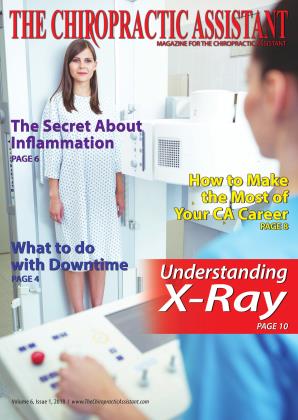The Best Kept Secret about Inflammation
Keith Giaquinto
DC
The body employs inflammation as its first line of defense to oppose any of the possible injurious threats it may encounter. Inflammation itself is not as bad as some people may believe. Acute inflammation is a good thing because it has a very important task to do. It begins the healing process, but it should be transient. The bad reputation that inflammation has developed is when it becomes chronic because the injurious threat has not been removed.
The five cardinal signs of inflammation are fever or heat, redness, swelling, and pain, all accompanied by loss of joint range of motion. "Inflammation is the most common, the most carefully studied, and the most important of the changes which the body undergoes as the result of disease." Textbook of Pathology, by William S. Boyd, MD.
Contrary to television commercials and prevailing medical practices, inflammation should not be suppressed or treated as a disease or condition. Rather, it ought to be viewed and supported as the body's first response in the healing process. The body initiates the inflammatory process due to tissue irritation, musculoskeletal
injury, or infection. Logically speaking, inflammation should not be impeded or prevented, but suppressing the symptoms of fever, redness, swelling, or pain through pharmaceutical means has become usual and customary.
Aspirin has long been recommended to relieve the symptoms of inflammation, as well as to reduce the risk of heart attack and stroke in patients who have already suffered from these conditions. However, researchers insist that while aspirin lowers the risk of having a heart attack, it is not recommended as a preventative for people who have a low risk of developing heart disease. Many people do not know their heart disease risk and, perhaps due to the cultural norm, will decide to treat themselves. They rely on television and magazine advertising for information instead of what is in their best interest for their long-term health.
Inside Inflammation
When a cell is damaged, it releases substances called prostaglandins, which carry a chemical message to the brain that the cell is in need of repair. The brain responds to the signal by initiating an inflammatory
response that occurs in two stages. First, it opposes the irritant (symptoms), and second, it begins the healing or repair process. Aspirin destroys the prostaglandins so that the distress signal is not sent to the brain, the irritant is not opposed, and the healing process does not occur. We get relief of symptoms, but we don't stop or combat the threat that caused the inflammatory response.
Prostaglandins also maintain a protective lining in the stomach and aspirin damages the stomach lining. Between 30 to 40% of all hospital admissionsfor bleeding ulcers are caused by aspirin.
Inflammation also causes a "clumping" of red blood cells and aspirin will reduce that by "thinning the blood." This means that aspirin has the ability to break up the clumps. A single dose of two regular-strength aspirin affects normal clottingfor as long as seven days. That is why patients scheduled for any type of surgery are warned not to take aspirin for several days prior to their surgery. It also irritates the lining of the stomach for 72 hours! So, to prevent damage to our stomach lining, we are told to use a baby aspirin each day.
Use of aspirin duringthe last three months of pregnancy may cause bleeding problems for the fetus before or during delivery, or for the newborn infant. It may in-
crease the length of pregnancy, prolong labor, cause other problems during delivery, and even cause bleeding for the mother before, during, or after delivery.
Inflammation is a necessary reaction in the body to begin the healing process. Aspirin does not promote the healing process. There are ways to support a normal inflammatory response to help your patients heal quicker that doesn't suppress the response. Using enzyme nutrition in your practice is very safe and effective by working in harmony with the body's natural physiological reactions, and they promote healing.
For more information on seminars and food enzyme nutrition, chiropractors may call the Food Enzyme Institute at 800-662-2630 to set up an account.
Dr. Keith Giaquinto has more than 12 years of clinical experience as a chiropractor and ⅞ ^ internal health specialist. He frequently lectures to companies and groups in his community on topics of health and wellness. He has created a new patient lecture system for growing your practice through lecturing. You can contact him at www.drkeithgiaquinto. com. For more information on seminars andfood enzyme nutrition, chiropractors may call the Food Enzyme Institute at 800-662-2620 to set up an account.
 View Full Issue
View Full Issue
